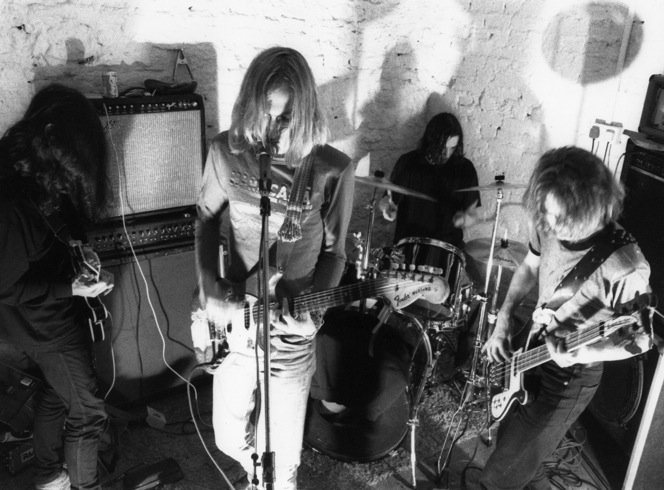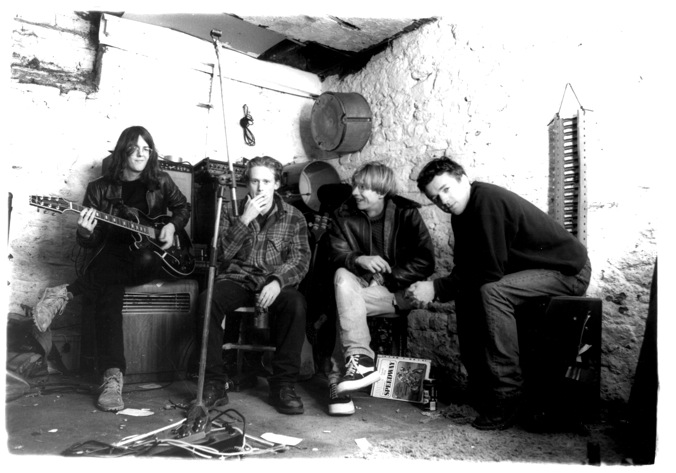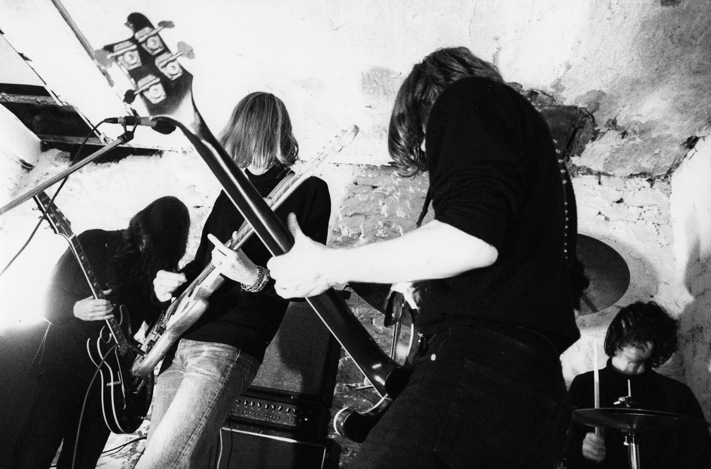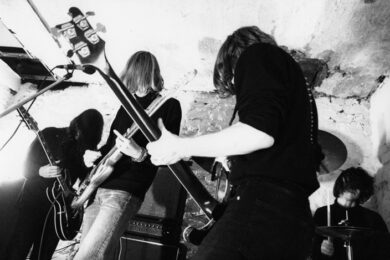H.O. Morgan’s Spotify mix for The Quietus
The place was Tilburg in Holland, and the date was April 19th, 2008. The Heads – Bristol’s psychedelic rock veterans of no small repute – had made the journey over to play the Roadburn festival. Yet despite the underground kudos attached to such a show, the four members of the band had found themselves prone to a curious malaise. A large bag containing all the merch that the band had brought over for the occasion sat unopened, as they sat under some black cloud of their own creation nearby, saying nary a word to each other. Eventually, a friend of the band, rolling their eyes, struck a deal with the surly bunch: If The Heads really couldn’t be arsed to sell their own merch, she would do it instead, for a small cut of the money. The Heads agreed. Within moments of the first contact between the vinyl and the table, a coterie of eager psych-fiends had already gathered nearby.
Within an hour, every item of merchandise The Heads had brought with them had been sold.
Such are the ways of a band who, some twenty years after their inception, still can’t seem to be mentioned without the prefix ‘underrated’ lingering somewhere nearby. A bunch of unassuming fellows who seem to have defined themselves as arch-proponents of a particularly potent kind of slacker culture, a place forever redolent of half-full cans of Stella, overflowing ashtrays, scratched copies of Hawkwind’s Space Ritual, posters of Caroline Munro and grainy VHS dubs of Psychomania watched on a TV with fucked vertical hold. Since their landmark ’95 debut Relaxing With…, which was re-released last month replete with a terrifying and exhaustive selection of bonus material, The Heads’ scuzzy nirvana, equal parts Stoogian rifferama, kraut-infused repetition and spacerock dementia, has effortlessly charted a path from the mildew-ridden basement to the stars.
Sat upstairs in Camden’s Koko prior to the band playing a rare show supporting Mudhoney (one of their formative influences), it’s still particularly tricky to get this band excited about their own music. Simon Price, their frontman (‘by default’) is being quizzed as to when he felt that the band, having first bonded over old Loop and Can records, found a style of their own. An amused pause follows.
"Never have!" he drawls, his speaking voice recognisable from the deadpan drones of his vocals. He aims his spliff out of the dressing-room window into the autumnal gloom. "I’ll let you know."
The Heads – KRT 5-1 by JohnnyorocketLuckily, The Heads have other people prepared to sing their praises, notably Simon Keeler, their "whipping boy, dogsbody" and chief enthusiast for much of the nineties. For all the band’s own gloomy self-deprecation, they were exactly what the doctor ordered for this particular rocker when they first made contact with his tinnitus-prone ears.
“Well, I first heard them in 94. It was a real breath of fresh air” he reminiscences. “I was really into the whole late 80s grunge and Sub Pop stuff, and also liked Walking Seeds, Pussy Galore, Loop and Gallon Drunk, and then I lived in Melbourne from 91 to 92, where I became even more obsessed with amped up and noisy rock & roll, Even America was limping along poorly with its hyper diluted grunge-lite pap. But when I came back to the UK, there was nothing. Somehow The Heads first single hit the right spot. An awesome bit of focussed/ramshackle, wah-driven bluster that fitted right in with the Pussy Galore, Stooges and Monster Magnet records I listened to at home.”

Look to the genesis of The Heads, and the band’s somewhat downbeat demeanour – effectively that of four men with absolutely no serotonin in their bodies whatsoever – becomes understandable. Everyone who’s ever frequented a second-hand record store in the last twenty or so years will at one point or another have been either patronised or dealt a lethal dose of the passive-aggressives from a surly, uncommunicative bloke behind the counter. True to form, Replay Records, one of the most celebrating Bristol hipster haunts of rack-flicking aplenty (don’t look for it; it’s, alas, not there anymore) was populated by more than one member of the Heads for almost all of the 90s.
“It was just for ten years, all I did all day was listen to music in the shop”, mutters Simon Price. “You pick up a few ideas I guess, and you can hunt out shit you’ve never heard in your life. You’ve got hours to play this stuff, so, a bit of exploration.”
“Pricey and Hugo [Morgan – bass], were fucking music snobs and nerds, it has to be said“, notes Keeler. "‘Oh you haven’t heard’ insert name of super obscure Kraut LP here ‘?’ But that’s proper record store parlance isn’t it? Mind you, when Hugo found out two of my favourite films were Mad Max and Mad Max 2, he obtained the soundtracks on vinyl for me. That was nice.”
From this motley assortment of dusty vinyl, a sound began to coalesce between the four members [completed by Paul ‘Prof’ Allen – guitar and Wayne Maskell – drums] taking inspiration from the kind of treats to be found on Hugo Morgan’s spotify play list above. Relaxing With…, marked a clement landmark where Mudhoney’s sarcastic scuzz came face to face with Hawkwind’s cider-chugging astral awaydays. It was the culmination of several years’ worth of basement racketeering. A testimony to gallons of tea, numerous destroyed brain cells, many miles travelled in rickety transit vans and numerous gig payments of a six-pack of Hula Hoops.
In the light of such travails, the demoralising climate they existed in in the 90s, and purely in terms of being a British band, The Heads’ ‘underrated’ status can be a moot point at times. An unfortunate truism remains that stoner rock, the genre pigeonhole that the band all-too-often tended to find themselves in, was far more amenable to bands with a sunnier outlook and a less sarcastic disposition than perhaps these Avon malcontents could lay claim to. Comparable bands like Nebula and Fu Manchu, despite their lank hair and scruffy threads, couldn’t help but look glamorous next to The Heads.
“I think their relative obscurity, relative being the key word here, is more down to the way the music industry works” reflects Simon Keeler. “I mean, slogging up the M1 for a £50 gig in front of some real floppy fringed mummy’s boys wanting the next Verve cant have been too heartening really. And to this day, they still don’t have a proper soundman, only someone murmuring ‘Turn the lead guitar up a bit mate’ to the front of house bloke. Of course, we met some right charlies along the way: ‘Yo mate, we can’t hear the vocals clear enough, I am turning the bass down and the singer up.’ Most of these people had ponytails.”
“You might recall,” he continues, warming to the theme, “that the likes of Suede, Oasis, Blur et al ruled the inkies and airwaves. No one gave a fuck about four hairies from Brizell who didn’t do trip hop. I couldn’t hire a PR, they cost a fortune, and just talked bullshit. Fighting to get heard and seen amidst the stench of Brit Poop, well, it wasn’t fun… And still, they sold 4,000 plus copies of a debut album. Not sure many UK bands around then managed that. With their debut? On the peanuts we had?”
The band toured where they could. A messy and rewarding traipse around Europe with Motorpsycho and an unexpectedly successful jaunt with Magic Dirt in the UK ensued. Moreover, The Heads received a couple of notable leg-ups, one being the patronage of John Peel, who was heard to utter the now semi-legendary: "If that’s not a freakout, I’m a Dutchman", after a particularly incendiary version of ’Spliffriff’ graced one of the three sessions they recorded for him. The other was by meeting the ears of Frank Kozik from Mans Ruin, then something of an avatar of cool for wasters of a certain stripe. Following the release of two 10-inch singles and the Time Is Now compilation on that label, money was still tight, but oddly, the enforced poverty helped to create what still arguably stands as The Heads’ masterpiece, the pangalactic fuzz-drenched nightmare scenario that is the gloomily-titled Everybody Knows We Got Nowhere, which was finally released in 2000. This compendium, which may be the only psychedelic odyssey to include band members muttering about whether to have a fag break or not, lurches from whacked-out-jam to feverishly demented Iggy-fied garage-freakouts to eerie, krautrock-tinged abstraction in intimidatingly malevolent fashion, and somehow also hangs together as a near-70-minute transmission from a particularly dope-fogged quarter of Hades. The patchwork nature of its sound is no surprise, given that the album’s no-budget status essentially transformed it by some odd case of psychedelic serendipity into the stuff of maverick genius. Pretty much no actual recording studio outside of The Heads’ basement space was actually used in its gestation.
“I raised some money by putting out a ‘hot’ 7” release on my Butcher’s Hook label“ relates Simon Keeler. “And with that money the band were able to go into the studio with a bag of tapes and DATs. Real recordings, rehearsal, live tapes, and field recordings. Shawn Joseph was able to stick together all the parts and make it as one, with the whole band and me on his shoulder. Seven to eleven different sources created that album. Somehow that album really does just psych out. It’s a full release. I mean come on, that intro of ‘Legevaan Satellite’; That brutalizes. You get riffs, you get wobbly psyched bluster, then some samples wired into the body… speedway recordings, odd filmspeak, all melded into one great long player.”
True to form, despite them acknowledging this album’s strengths, you aren’t going to get anything resembling that kind of enthusiasm out of The Heads themselves.
“My favourite’s Everybody Knows We Got Nowhere”, offers Simon Price.
What d’you think it is about that that makes it stand out?
“I dunno”, he ponders. “We were un-knowingly at a bit of a peak then. I was just good, it was just a good album, I dunno.”
“I was listening to that the other day”, muses Paul. "I wasn’t too sure about it myself, I like some of the tracks but the production, was, I dunno…”
“There was no production!” adds Simon.
You’ve hardly ever really had a studio or a producer though. Was that deliberate?
“Nah, it was just fuckin’ slackness.”
One particular gig that this writer attended stands out from this period, at Camden Barfly in May 2001, where The Heads’ incendiary overload of cosmically-aligned wig-out was deployed at volumes fit to buckle the very foundations of the watering hole itself. Not to mention being bolstered by an incredible lightshow from fellow Bristolian Johnny O that took the Hawkwind lineage of psych-visuals and supercharged it to intimidating and aesthetically enchanting proportions. Staggering down the stairs afterwards, with one’s ears pummelled to the point where all conversation sounded like it was taking place underwater, it was tempting to reflect that even though this band had the look and stage presence of four librarians, they nonetheless possessed a unique and rare sleight-of-hand to their full-throttle mind-melt that effortlessly transcended reductive pigeonholing and extremity-and-repetition-for-its-own-sake, not to mention almost all of their contemporaries. Like chemically-altered nerds who’d fallen prey to a small-hours epiphany and somehow laid hands on some mystical formula for unlocking the mysteries of dimensions beyond this island Earth, The Heads created vibrations that night that united the cosmic and the mundane in jaw-dropping style.
Unfortunately, in the near-decade since, sightings of The Heads have been sporadic at best. Part of this, it would seem, could be down to one of the rare breaks that came their way, a tour of the West Coast of America with Nebula, that apparently did more to damage the band’s fragile physical and mental state than it actually did them good. Details are sketchy about this trip, other than, along with the band giving the like of Nebula, High On Fire and The Monkeywrench a run for their respective monies, it also involved copious amounts of booze and trucker speed, numerous scrapes at state borders and in one case even a petrol bomb attack on the band at Sacramento, apparently after a broken bottle made contact with a ceiling fan.
“I think it put us off touring for good probably”, reflects Price. “I just don’t think we could handle it. We didn’t take it at the right pace. It was only about nine dates, but we just got trashed I guess.”
The band recovered themselves enough eventually to make another album in 2002, originally to be namer Troppo Ampio but eventually emerging under the none-more-Heads pseudo-self-deprecating title of Under Sided. “It might be overlooked because of the sheer whitenoisepsych ride of ‘Everybody Knows’, but some of the playing on that album is untouchable“ raves Keeler. “Paul’s white hot soloing simply destroys, some of Simon’s vocal delivery is by far the best thing laid to wax by him, the rhythm section is furious, and this album contains some of the Heads’ fiercest pummelling.”
The triumphs and travails have slowed down to a semi-retirement pace in the time since, with day jobs, relationships, relocations and children taking their toll on the band’s workrate, which it’s fair to say wasn’t exactly lightning speed in the first pace. The faithful have nonetheless been rewarded with another album in In The Grip Of A Headlong Dive, an expertly-pieced together compilation of rehearsal tapes that went by the name of Dead In The Water, and various live shows in which The Heads have casually destroyed whoever was headlining that night without breaking a sweat, the most recent unfortunates to bear this brunt being Wooden Shjips a couple of years ago. The Heads still live on, as sullen and glorious as ever. When they can be bothered.
“Maybe it has cult stamped all over it, but their psychedelic racket really sets them way apart from anything being done in the UK at that time or now“, reflects Simon Keeler. “Really, they left that leaden stoner ‘scene’ standing… but of course, its not easy, and life does go on. Their albums don’t sound dated, or sound like they have a sell by date. Biased I may be, but I stick on the first album, and its riffs and structure floor me, then I go to the second album, and nothing like that was being done at that time. It’s a proper album length psychedelic trip.“
So, to what extent have the member of this great band been architects of their own demise? Could it be that slackness and low-self-esteem have stopped them achieving any more than they might’ve done in twenty-odd-years?
“I don’t know what I would have done differently. Everything or nothing”, reflects the ever-helpful Simon Price, now, inexplicably, a primary school teacher by trade. “We were never hip, so you can never be un-hip and all that shit. It’s a bit hard for us to appreciate that we’ve done anything other than play the same shit for fifteen years”
“I still can’t see too much ‘slacker’" Keeler notes. “Maybe Pricey comes across that way, but Wayne, Prof, and Hugo don’t. The overflowing ashtrays, half-full cans of Stella image, that’s not there so much now. More often than not, it will be a crate of bottled water, apples and bananas, roll ups, and Pricey’s jazz ciggies that spill everywhere. Maybe a few cold ones. Not that fucking Budweiser again please. And some red wine for after.”
“Unpaid council tax bills, you can’t have that anymore, cos it‘ll fuck your credit rating up” he concludes pragmatically. “And if you dare scratch my original copy of Space Ritual I am going to fucking nut you.”




